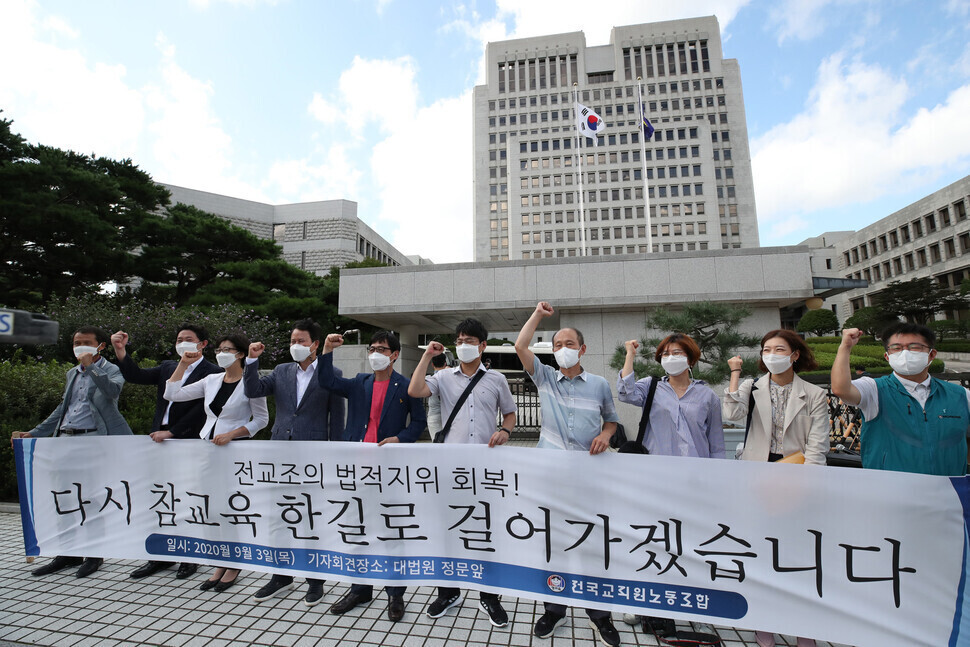hankyoreh
Links to other country sites 다른 나라 사이트 링크
[Editorial] Supreme Court’s KTU ruling is hopefully a new start to guaranteeing basic labor rights

The full bench of South Korea’s Supreme Court ruled on Sept. 3 that the previous administration’s decision to strip the Korean Teachers and Education Workers Union (KTU) of its legal status was itself illegal. The Supreme Court’s ruling comes seven years after the KTU asked the courts to reverse the decision made by the Ministry of Employment and Labor (MOEL) in October 2013, during the presidency of Park Geun-hye, to not regard the KTU as a legitimate labor union under the Act on the Establishment and Operation of Teachers’ Unions. The past seven years have witnessed a long and arduous campaign to correct that arbitrary executive decision, which infringed on the basic rights of labor. At last, the courts have found a way for the KTU to regain its legal status.
On Thursday, the Supreme Court remanded the case to the Seoul High Court, finding that the “Enforcement Decree of the Trade Union and Labor Relations Adjustment Act, which provided the grounds for stripping [the KTU] of its status as a legal union, is invalid because it places fundamental restrictions on the three rights of labor that are guaranteed by the Constitution,” the Supreme Court said.
MOEL had justified its decision on the grounds that it was illegal for the KTU to allow nine dismissed teachers to remain on its rolls; unless the KTU reversed that decision, MOEL had said, it could not be accredited as a union. But the Supreme Court concluded that the section of the enforcement decree providing the legal basis for MOEL’s argument was itself unconstitutional. The Supreme Court’s ruling basically rectifies a case of misplaced priorities.
The reality is that the government’s decision to remove the KTU’s legal status was more motivated by ideological opposition than legal interpretation. Since its establishment in 1989, the KTU has been subjected to persistent ideological attacks, and KTU members have undergone numerous sacrifices, losing their jobs and being put in jail, on the path of gaining recognition for teachers’ right to unionize. Even after the KTU was officially recognized, it has suffered from unfair attacks, such as the list of members being illegally made public. Chief Justice Yang Sung-tae was even accused of colluding with the Park administration in connection with the KTU lawsuit.
Lawmakers on the Legislation and Judiciary Committee with the opposition People Power Party (PPP) released a statement arguing that the judiciary has surrendered its independence, which completely disregards the mistakes made by the judiciary under Yang’s leadership. Those lawmakers made the misleading claim that the Supreme Court’s ruling piggybacks on a draft amendment to the Act on the Establishment and Operation of Teachers’ Unions submitted by the government in June that would enable teachers who aren’t currently on the job to join unions. They are also studiously ignoring the fact that the European Union and other bodies in the international community have repeatedly called for that act to be revised on the grounds that it violates key conventions of the International Labour Organization (ILO).
In July, the government asked the National Assembly to ratify those conventions, which guarantee the rights of unemployed and dismissed workers to take part in union activities. Instead of smearing the Supreme Court’s decision with outdated political arguments, the PPP ought to cooperate with ratifying the ILO’s key conventions and take aggressive action to revise Korea’s labor legislation, which falls far short of the standards of the international community.
Please direct comments or questions to [english@hani.co.kr]
Editorial・opinion
![[Editorial] Penalties for airing allegations against Korea’s first lady endanger free press [Editorial] Penalties for airing allegations against Korea’s first lady endanger free press](https://flexible.img.hani.co.kr/flexible/normal/500/300/imgdb/original/2024/0502/1817146398095106.jpg) [Editorial] Penalties for airing allegations against Korea’s first lady endanger free press
[Editorial] Penalties for airing allegations against Korea’s first lady endanger free press![[Editorial] Yoon must halt procurement of SM-3 interceptor missiles [Editorial] Yoon must halt procurement of SM-3 interceptor missiles](https://flexible.img.hani.co.kr/flexible/normal/500/300/imgdb/child/2024/0501/17145495551605_1717145495195344.jpg) [Editorial] Yoon must halt procurement of SM-3 interceptor missiles
[Editorial] Yoon must halt procurement of SM-3 interceptor missiles- [Guest essay] Maybe Korea’s rapid population decline is an opportunity, not a crisis
- [Column] Can Yoon steer diplomacy with Russia, China back on track?
- [Column] Season 2 of special prosecutor probe may be coming to Korea soon
- [Column] Park Geun-hye déjà vu in Yoon Suk-yeol
- [Editorial] New weight of N. Korea’s nuclear threats makes dialogue all the more urgent
- [Guest essay] The real reason Korea’s new right wants to dub Rhee a founding father
- [Column] ‘Choson’: Is it time we start referring to N. Korea in its own terms?
- [Editorial] Japan’s rewriting of history with Korea has gone too far
Most viewed articles
- 160% of young Koreans see no need to have kids after marriage
- 2Presidential office warns of veto in response to opposition passing special counsel probe act
- 3S. Korea “monitoring developments” after report of secret Chinese police station in Seoul
- 4Months and months of overdue wages are pushing migrant workers in Korea into debt
- 5Hybe-Ador dispute shines light on pervasive issues behind K-pop’s tidy facade
- 6[Editorial] Penalties for airing allegations against Korea’s first lady endanger free press
- 7OECD upgrades Korea’s growth forecast from 2.2% to 2.6%
- 8Inside the law for a special counsel probe over a Korean Marine’s death
- 9Japan says it’s not pressuring Naver to sell Line, but Korean insiders say otherwise
- 10[Exclusive] Hanshin University deported 22 Uzbeks in manner that felt like abduction, students say